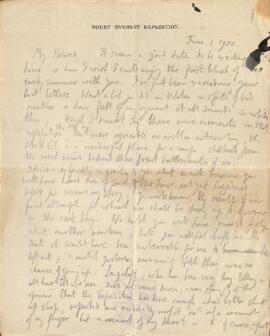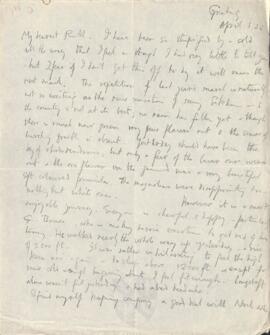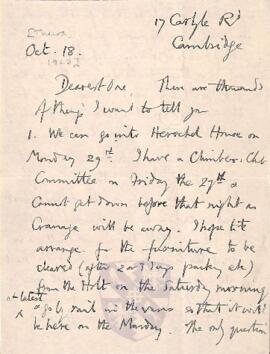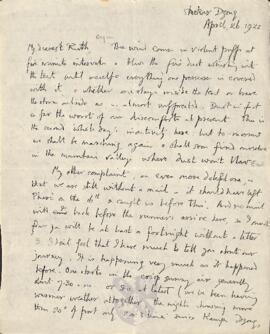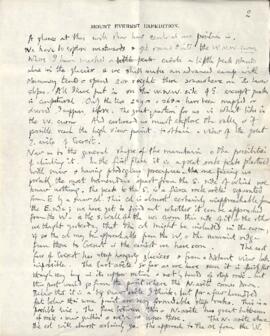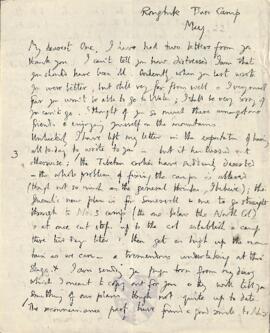Letter to Ruth Mallory, from Base Camp
Brief Summary
First summit attempt without oxygen and waiting to hear about Finch and Young Bruce’s summit attempt with oxygen.
Detailed Summary
Had received mail from her and read news of Pen y Pass. Four of his fingers on the right hand had been touched by frost bite but only the top joint of the third finger gave him any trouble and he didn’t think there was any danger of losing any part of it. Poor Morshead was a very different case and they didn’t yet know what the damage would be. Thought it was stupid or careless of them to be caught out as it was easy enough to keep hands warm with gloves if you weren’t doing too much with them. He took the lead over from Morshead and cut the steps as quickly as possible for fear the porters would be done in by the cold and refuse to continue. Morshead was insufficiently clothed and didn’t know his fingers were caught until the following night. He had wrecked himself cutting the steps and when they were pitching tents hardly had the strength to lift a stone. The night at 25,000 ft was miserable and he didn’t expect to go on.
Somervell was the reserve man all through and was particularly useful in cooking at the high camp. Norton went first on the final day and was very nearly done at the end and was climbing very slowly. They could have gone further but turned back to allow time for the descent. On a fine morning they would have started 2 hrs earlier and reached the N. E. shoulder.
He lead on the descent except where they had to cut steps. He and Norton shared the cutting as he judged he would be quicker than the others. He felt pretty strong on the descent. The slip was nearly a bad business. He hadn’t realised how shaky Morshead was and had cut rather poor steps. Norton and Somervell must have been caught napping. He didn’t have the rope belayed round his waist as he was on the point of cutting a step. Hearing something wrong behind drove in his pick and belayed and was ready in plenty of time when the strain came. Morshead must have made a very fine effort coming down the steps of the snow slope as he appeared to tread quite safely; but the moment they were on easier ground he collapsed. He didn’t like the idea of being out after dark above 23,000 ft. It was a very trying and anxious time.
Next morning there was a lot of hard work cutting steps down from Chang La [North Col] and they weren’t down to Camp 3 until after noon. They walked down to Base the next day and were a very tired party, and all except Somervell, had remained tired. The rest of the party were very pleased with their performance. Thought that the three of them were out of it now. Norton’s ear and his finger were frostbitten and Longstaff wouldn’t hear of them going up again until they were healed. It was annoying as he wanted to make one more try from a camp at 26,000 ft.
They were a perfectly happy party at Camp 3. Apart from the anxiety he had enjoyed it tremendously.
Thinks he won’t have answered all her questions. Says he is still feeling stupid and it was a great effort making a narrative for the press. Wonders what people at home think of them.
[Continues later] - Had just received 3 letters from her and also letters from all his family. Comments on her time in North Wales and hopes she is better for her holiday. Of Pen y Pass he says he knows nowhere that one comes away from feeling so strong. Had a very nice letter from David [Pye] about Pen y Pass. It was almost certain that they would be leaving Everest on her birthday and should be in Darjeeling about 7 July at latest, and hoped to be home by early August. Thought he might take a week to travel through India and then take another week coming round by sea to London. He hoped for one spell of walking with her before October, mentioning the good places they still had to visit together, Teesdale in late spring, a Yorkshire dale, golden in September, and Derbyshire, or the west country again.
[Continues later] - He had been dictating to Morris [General Bruce’s secretary] while he typed up a narrative of their climb. He had worked out she ought to get news of their climb very near the date of her birthday and this letter should reach her on 4 July, and on the same day he should arrive in Darjeeling.
Details future travel plans as he wants to see something more of the world. He may see the Bullocks on his way home as he had heard from him the other day full of questions about the expedition. They had both been ill and asks Ruth to write to Mrs Bullock as she would be glad to hear from her. He had written a note to his mother and had received one from his sister Avie and hoped she was really better.
He had been thinking of a plan for them to meet in the Alps on his way home but felt she wouldn’t come because of the expense, but if she did it would be easy for him to meet her there. He didn’t know whether Geoffrey Young had secured the Tyndall chalet but if so they could go there which would make a great difference. Tells her how to get there and what costs would be involved.
[Continues later] - they were waiting for news of Finch and G. Bruce’s attempt to summit using oxygen. Thinks they would certainly break their record as they have had very good weather but he didn’t expect them to have reached the top at the first attempt. It all depended on whether they succeed in dumping cylinders ahead of them. He didn’t feel jealous of any success they may have. Getting up with oxygen was so different from their attempt that the two hardly enter into competition. He chaffed because his finger kept him in camp and Longstaff had no idea how bad it was. It was extremely sensitive to cold and if he went up again he would get a real bad frostbite so he had to be patient.
Norton was responsible for collecting flowers with Longstaff’s help. As Longstaff had to go back in a hurry Norton had asked him [Mallory] for help and what they found the previous year. He could easily do this without much loss of time but would be a week later reaching Darjeeling. The idea of seeing seeing the early flowers between there and Kharta and near Kharta too attracted him.
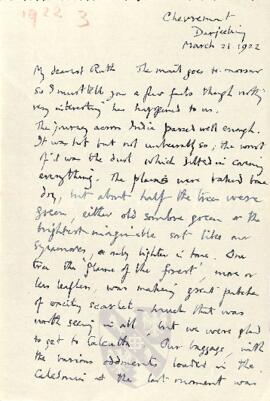
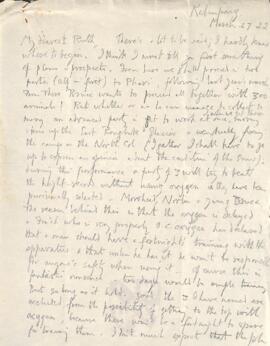
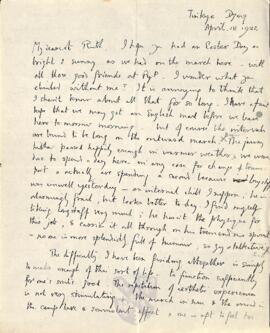
![Letter from George to Ruth Mallory, 26 May 1922 [first attempts to summit with and without oxygen]](/uploads/r/null/e/7/1/e713aa9025b80ad036db2212b403029949e0050e1f7d581c5ca4250b5afdcd7e/PP_GM_3_1_1922_15_watermark_142.jpg)
